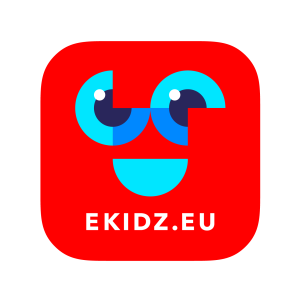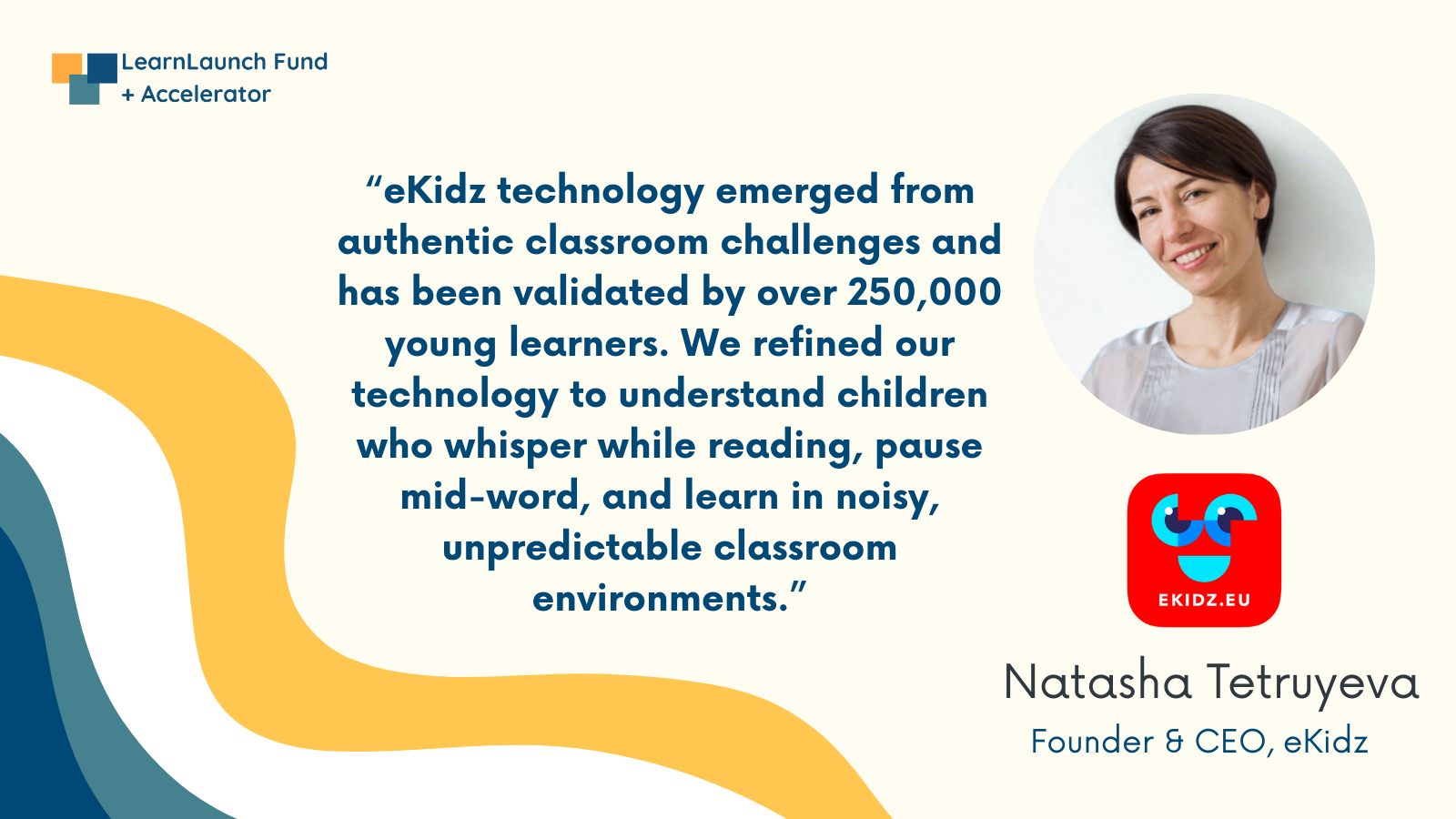Meet Natasha Tetruyeva, Co-founder of eKidz: a platform built with AI to support literacy development for young learners. Created alongside Felix Haffner and John McDonagh, eKidz helps children master reading and receive personalized support, whether they come from multilingual backgrounds or not. The platform features one of the most robust and extensively tested multilingual speech recognition systems, engineered within a framework of validated pedagogical methods and informed by deep understanding of the science of learning to deliver unbiased, personalized learning experiences.
In this conversation, Natasha shares her powerful personal journey that led to the creation of eKidz and how it has positively impacted the lives of over 250,000 children around the world and continues to grow.
Read on to learn how this technology is bridging the literacy gap while supporting the needs of next-gen, AI-powered learning environments.
What gap did you see in the market that inspired you to create eKidz?
Natasha: My inspiration comes from a personal story. My first child became selectively mute, and I quit my financial career. I had to participate in my son’s classes and being in a classroom setting opened my mind about children’s development. I learned that each child required special support to a certain degree in which teachers may not be trained for. With my own son, I was using a lot of technology-based learning, such as recording him doing presentations and sharing his thoughts in a comfortable and trusted environment, to then share his achievements in the classroom. I later had two kids that faced a similar issue of not conforming to the school or teachers’ image of a student. I had to stand for the education of my children. I am proud of them because they are now excelling academically and becoming confident individuals.
This experience taught me that in each child’s life, there is always a moment where they need more support. Unfortunately, it depends on how lucky they are to get support from their school or parents. In 2013, I moved to Germany and immediately noticed how technology was not incorporated in classrooms. At the same time, I’d witnessed technology help my kids alleviate language barriers and boost their confidence. In the modern world, there are many multilingual families which create a lot of diversity in the learning environment for kids. I then decided to develop technology that could be impactful for many children facing language or literacy difficulties in diverse communities.
How does eKidz’s AI-powered technology for literacy and language development differ from other educational technology solutions in the market?
Natasha: eKidz technology emerged from authentic classroom challenges and has been validated by over 250,000 young learners. We refined our technology to understand children who whisper while reading, pause mid-word, and learn in noisy, unpredictable classroom environments. We developed a voice engine specifically designed for early education needs, with a mission to make classroom applications truly conversational.
Our algorithmic approach centers on the classroom environment and delivers deep learning insights while supporting educators. For example, our speech recognition provides precise feedback on early readers’ phonics and word recognition, while our AI-powered reading fluency assessments monitor each child’s accuracy, speed, and prosody to offer continuous progress insights and personalized feedback.
eKidz assessments seamlessly automate formative reading evaluations within daily classroom routines. We examine critical details: whether key words receive proper emphasis, patterns in phoneme misreading, and frequently substituted words. This enables nuanced understanding of learners’ abilities across all competencies, from language acquisition through literacy development.
Currently, eKidz is developing our next innovation: integrating our voice engine with a fine-tuned LLM trained to deliver pedagogical responses and help students express their original ideas.
As eKidz gained traction in European classrooms, what were some of the most powerful ‘aha’ moments you experienced?
Natasha: I think the “aha” moment came when we collectively realized that teachers weren’t afraid of technology—they simply wanted the right tools for early education classrooms, and perhaps those tools just weren’t ready yet. Both students and teachers were motivated by eKidz’s first literacy app, and even more so when we released a feature allowing children to record everything they worked on: reading, retelling stories, and reflections.
That’s when another “aha” moment struck—we realized how crucial students’ sense of ownership over their achievements truly is. Everyone could showcase their progress, and teachers could respond quickly to it. Now, with new AI capabilities, what excites us is the motivational impact of instant feedback delivered to students just in time and precisely tailored to individual needs.
What kind of results have you seen in terms of reading goals attainment or engagement among students using eKidz voice engine providing instant feedback?
Natasha: With our new capability to provide instant feedback to students based on precise assessment by our speech recognition, an evidence study with over 1,400 participants demonstrated stronger improvements in reading proficiency. What’s particularly exciting is that the most substantial improvements came from students who had previously shown low motivation to read, suggesting that eKidz not only supports literacy development but also helps re-engage reluctant readers.
These outcomes aren’t just anecdotal. They’re grounded in rigorous, peer-reviewed research and large-scale pilots. This combination of scale and scientific rigor gives us strong confidence that eKidz is delivering on its core promise: to offer an equitable, effective AI-powered learning experience that works across ability levels and backgrounds.
Three reasons teachers love eKidz assessment: quickly identify students needing extra support, monitor progress of your entire class with no class time lost on testing, and accelerate learning for ALL students with an individual path to achieve fluency goals.
What key milestones are you focused on reaching during the LearnLaunch Breakthrough To Scale program? What impact do you hope to scale?
Natasha: We are looking forward to solidifying our US entry strategy and refining our investment narrative. We want people to know about the impact our voice engine can have and why a partnership with eKidz can be very successful. We have already deployed a very specialized technology to support all children whether it is their literacy journey or language acquisition journey. We want to pursue empowering teachers by easing the burden of understanding what’s going on in the academic progress of children. We are aware that AI cannot replace the presence of a teacher or a parent in a child’s educational journey, but we believe that AI can do a great job in assessing, giving feedback in a timely manner, and helping to progress a child’s learning faster.
Learn more at eKidz’s website here.








































































